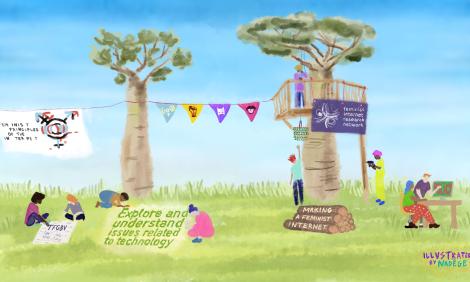
In depth
Why feminist research is necessary to address technology-facilitated gender-based violence: Recommendations and way forward
In spite of expanding awareness on online and technology-facilitated gender-based violence, there has only been an increase in the violence online in the last decade. Feminist research on the internet and digital technology show that there is a need for us to push for national and international instruments and transnational commitment to addressing the ongoing experiences of violence while…

In depth
Are we there yet? Online freedom of association and freedom of expression for women in the DRC
The women of Democratic Republic of Congo have been part of shaping the civic spaces for years, leading to the freedom of the country to now highlighting major rights-based issues. But in doing so, their voices have not only been silenced by age old patriarchal systems, but they have also been subjected to online violence that stifles their constitutionally protected right to freedom of…

Feminist talk
Is Tate Culture Infiltrating Religious Conversations and Spaces?
Andrew Tate is notorious for his misogynist ideologies and hateful narratives that he propagates through his online channels. However, since accepting Islam, he has found a particular audience among religious men and young boys who seem to have gotten validation of their conservative beliefs. Anmol Irfan discusses.

Feminist talk
Beyond Deterrence: Understanding the Chilling Effects of Technology-Facilitated Gender Based Violence
Technology-facilitated gender based violence has a direct impact on women and gender diverse folks' ability to navigate digital spaces freely. It not only hinders their experience of being connected, but also forces them to self-censor as well as employ patriarchal characteristics of a 'good girl' in attempts to stay safe from violence that comes with speaking up. Amrita Vasudevan discusses.…

Feminist talk
Creating A Space For Queer Expression On Pakistani Internet
The internet has given a space for self-expression to Pakistani LGBTQIA+ people. Where there are risks of being targeted as a result of this visibility, many young queer folks are finding a sense of community through the expression of those around them.

Feminist talk
Digital Waves of Hate: The Struggle Continues for Pakistan’s Transgender Community
The transgender community in Pakistan has constantly been subjected to persecution and violence hindering their participation in 'normal' life. This violence has increasingly been mirrored into digital world leading to plethora of hashtag campaigns initiated to damage the struggles of the community.

Publication
#OurVoicesAtIGF: OVOF Partners Meet at the Internet Governance Forum 2022
The partners of Our Voices, Our Futures (OVOF) meet at the 17th Internet Governance Forum (IGF) in Ethiopia on November 28 through December 2, 2022, to amplify the voices of structurally marginalised folks in six countries from Asia and Africa.

Feminist talk
Navigating Identities: Experiencing Online Violence As A Shia Woman in Pakistan
Shia Muslims are constantly at risk of being targeted with violence on and offline for their religious belief. And with online gender-based violence routinely a problem, when Shia women and queer folks go online, they find themselves at risk of being targeted with abuse from multiple fronts as their two identities combine.

Publication
Feminist Internet Research Network: Meta-research project report
The Feminist Internet Research Network (FIRN) and the Association for Progressive Communications (APC) Women’s Rights Programme’s knowledge building strategic team conducted a meta-research project that focused on the methodological processes and ethical practices of the eight research projects implemented as part of the FIRN project. Meta-research is the study of research, including its…

Feminist talk
The Case of Selective Morality, Sexist Laws and Online Censorship in Pakistan
Internet censorship in the name of morality in Pakistan is rampant, and the trend continues to grow as new laws and regulations are introduced. But just a cursory look at this trend reveals that the censorship is not just vague, but also sexist, targeting women's expression and experiences online.




